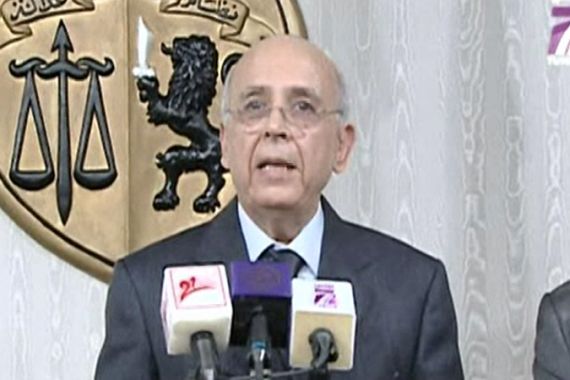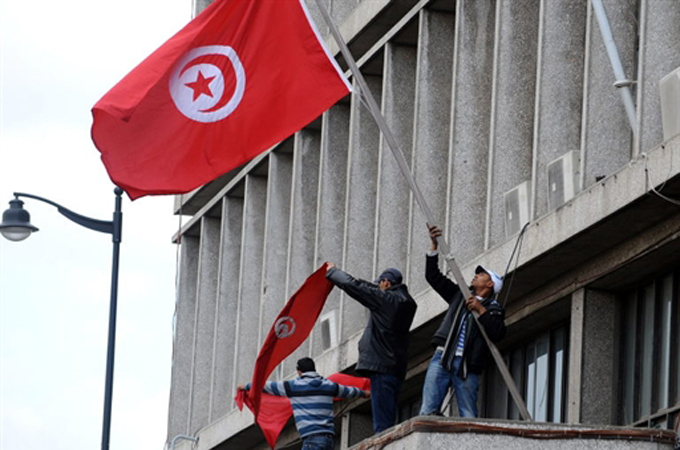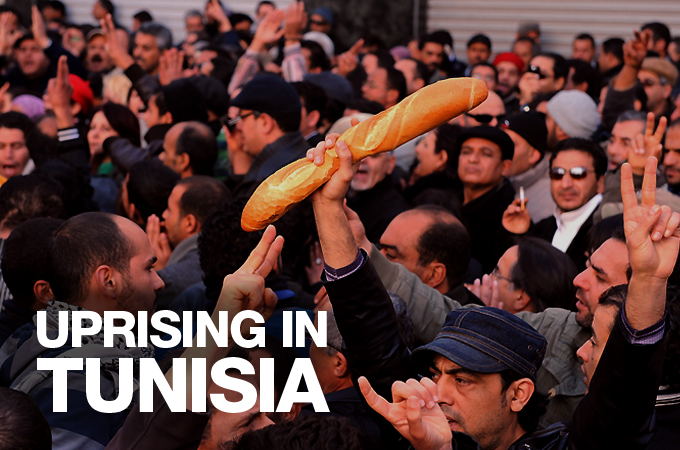PM replaces Tunisia president
President Zine El Abidine Ben Ali leaves country following violent clashes in the capital, Tunis.

 |
| Earlier on Friday, protesters gathered outside the interior ministry demanding that the president resign [AFP] |
Tunisia’s long-standing president has left the country amid violent protests and the prime minister has taken over control of the government.
“Since the president [Zine El Abidine Ben Ali] is temporarily unable to exercise his duties, it has been decided that the prime minister will exercise temporarily the [presidential] duties,” Mohammed Ghannouchi, the Tunisian prime minister, said on state television.
Ghannouchi is now the interim president. He cited chapter 56 of the Tunisian constitution as the article by which he was assuming power.
Noureddine Miladi, a sociology and media lecturer of Tunisian origin, told Al Jazeera what Ghannouchi did was unconstitutional.
“It is manipulation of the constitution. It has been argued by the likes of Iyad bin Ashur, one of the top lawyers in Tunisia. He argues that the head of parliament is the only legitimate party able to form a legitimate [caretaker] government, for about 45 days and then [they must] call for elections,” Miladi said.
“He [the speaker of the parliament] is supposed to oversee the success of the election. Ghannouchi is part of the same corrupt political elite as Ben Ali. There is nothing new in what happened today, it is a different twist of the game.”
Tensions high
Tensions remain high despite Ben Ali’s exit, with protesters reported to be ransacking government buildings in the capital, Tunis, and other cities. Citizens have made appeals for protection of their property, as several provinces are currently reporting unrest.
Protesters are reportedly demanding that the new interim president, a close Ben Ali ally, stand down.
Saudi Arabia officially anoounced early on Saturday that it was hosting Ben Ali and his family.
A palace statement carried by the official SPA news agency confirmed that Ben Ali arrived early on Saturday in the kingdom.
“Out of concern for the exceptional circumstances facing the brotherly Tunisian people and in support of the security and stability of their country… the Saudi government has welcomed President Zine El Abidine Ben Ali and his family to the kingdom,” the statement said.
A Saudi source said earlier that Ben Ali’s plane had landed in the Red Sea city of Jeddah but did not specify who had accompanied him to the kingdom.
Earlier, French media reported that Nicolas Sarkozy, the French president, had refused to allow Ben Ali to land in his country.
In his televised address, Ghannouchi vowed to respect the constitution and restore stability, and called on citizens to “maintain patriotic spirit … in order to brave through these difficult moments”.
He also vowed to carry out inflation and unemployment redressal policies “exactly” as they had recently been announced by Ben Ali.
Ayesha Sabavala, a Tunisia analyst with the Economist Intelligence Unit in London, told Al Jazeera that with President Ben Ali out of the country, there are “only … a few people … capable of [running the country] within the RCD [the ruling Rassemblement Constitutionel Démocratique party], and Ghannouchi is an ideal candidate”.
 |
| Follow Al Jazeera’s complete coverage |
Abdel Karim Kebiri, a former senior adviser to the International Labour Organisation, told Al Jazeera that “the people will be happy” with Ben Ali’s departure.
Al Jazeera’s Hashem Ahelbarra said the days events were a “political earthquake” and “something unheard of”.
He said that it was also as yet unclear what role the army was playing.
It was reportedly moving towards the capital to “take charge of the situation from the security forces, which are seen by Tunisians as a main problem for its long record of human rights abuses”.
Violent unrest
Friday’s developments come following weeks of violent clashes across the country over unemployment and rising food prices.
Matters came to a head in the capital, Tunis, on Friday, as police tear-gassed protesters gathered outside the interior ministry building. Witnesses said police used batons to disperse the crowd, but the protesters insisted they would not leave until Ben Ali steps down.
Sabavala opined that Ben Ali’s exit will “certainly lessen these protests, but whether they completely stop – the only way that is going to happen is if the interim government immediately starts implementing plans to address the issues that have been at the core of these protests”.
| IN VIDEO |
|
Hundreds of protesters gathered on Friday, demanding Ben Ali’s resignation |
“Simply bringing in an interim president, and especially one who has been close to Ben Ali … is not going to be enough,” she said.
“Logically, there is bound to be a lot of distrust, because Ghannouchi is part of the very close inner circle … of Ben Ali. Past promises that have been made [by that government] have not been kept.”
Kamaal Bin Younis, a Tunisian journalist, reported that there have been expressions of discontent with the choice of a Ben Ali ally as interim president.
State media earlier reported that Ben Ali had imposed a state of emergency in the country and promised fresh legislative elections within six months in an attempt to quell the wave of dissent sweeping across the country.
There were also reports that the airport in Tunis had been surrounded by troops and the country’s airspace has been closed. Air France, the main international airline into and out of Tunisia announced that it had ceased flights to Tunisia following that announcement.
State TV reported that gatherings of more than three people had been banned, and that violators would be shot by security forces if they did not heed their warnings.
Seventy-four year old Ben Ali had been in power for the last 23 years, after taking power in a bloodless coup. On Thursday, he vowed not to seek re-election and reduce food prices in a bid to placate protesters.
But the pledges seemed to have little effect as fresh street protests erupted on Friday.
Growing frustration
The unrest in the country began on December 17, after a 26-year-old unemployed man set himself on fire in an attempt to commit suicide. Mohammed Bousazizi’s act of desperation set off the public’s growing frustration with rising inflation and unemployment, and prompted a wave of protests across the country.
| IN DEPTH | |||||||||||||
|
Ghannouchi, 69, is a trained economist who has been a close ally to Ben Ali for many years. Prime minister since 1999, he is one of the best-known faces of Tunisia’s government. He also has served as the country’s minister for international cooperation and its minister of foreign investment.
Chapter 56 of the Tunisian constitution, under which Ghannouchi has taken power, reads: “In the event the president of the republic is incapable of discharging his duties temporarily, he may order for his powers and authorities be delegated to the first minister, save the right of dissolving the parliament.
“During this period of temporary incapacity, the government shall remain standing until such state of incapacity is eliminated, even if the government is chastised.
“The president shall inform the speaker of the parliament and the chairman of the Advisers Board of the temporary delegation of his powers.”
